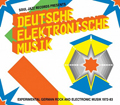
Various Artists: Deutsche Elektronische Musik: Experimental German Rock and Electronic Musik 1972-83 (Soul Jazz)
If you're looking for a history of Krautrock, look elsewhere. This two-CD compilation, by being largely true to its title across its 24 tracks, picks up four years after the birth of Krautrock, and the "rock" thrown into this set's subtitle seems designed to excuse a few crucial context-providers (notably Neu!'s "Hallo Gall"). But the concentration on electronic music is hardly regrettable; on the contrary, it provides crucial focus and coherence. Nonetheless, the track sequence immediately exhibits a certain eclecticism (or, less charitably, merely seems haphazard) as a 1979 track, Can's highly discofied "Aspectacle" from the group's last pre-reunion album, kicks off Disc 1.
And, despite the electronic focus, there is a lot of variety, and more than just the usual suspects: the exotica-prog of Between's "Devotion"; the sweet West Coast-style psychedelia of Gila's "This Morning" (one of the most glaringly non-electronic tangents, which along with the better-known Popol Vuh's "Morgengruss" shows one of the roots of the latter's more mystical and grandiose style, represented here by "Aguirre 1"); the flute-heavy and, frankly, kinda goofy Kollectiv and Ibliss; the proto-new-age of Deuter; keyboard-heavy tracks by Michael Bundt ("La Chasse Aux Microbes: is my favorite new-to-me track here) and E.M.A.K. But, of course, most of the bands one would expect to hear (with the glaring exception of the uncooperative Kraftwerk, though ex-Kraftwerk drummer Klaus Dinger is represented by La Dusseldorf's "Rheinita") are well-represented. There are two tracks each from Popol Vuh, Can (besides the aforementioned track, there's the electro-funk "I Want More"), and Amon Duul II (qualifying only on the basis of brief splashes of synthesizer). Most heavily featured, quite justly, are of Dieter Moebius and Roedelius (a solo track each) and their bands Cluster ("Heisse Lippen") and Harmonia (two tracks; "Veterano" shows the influence of Minimalism's phase music period). The robotic electronica of Conrad Schnitzler's "Auf Dem Schwarzen Kanal" and Tangerine Dream's iconic "No Man's Land" are key, but the Faust selection is the oddly atypical "It's a Rainy Day, Sunshine Girl," and utterly superfluous in this context are Ash Ra Tempel's hippie recitation "Daydream."
I do think there is a critical component of this style missing here: Karlheinz Stockhausen. Perhaps including an excerpt from his electronic opera Sirius (which appeared during this set's time frame) would have been a licensing nightmare, but his influence on the scene cross-sectioned on this set was vast and oft-acknowledged; he was both teacher (to members of Can, among others) and example through his ground-breaking electronic music of the '50s and '60s.
One could also complain about the absence of Achim Reichel, a far more relevant figure than several included here. That said, though, this is a very enjoyable set, even the off-theme tracks (though after a few times through, I began skipping the two flute-heavy numbers). It includes, as usual with Soul Jazz compilations, an informative booklet.
